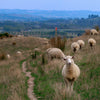
Genuine sheepskin

We love sheepskin and all the good things it bring. In particular, we love the natural product and sustainability. The sheepskin we sell at Nordic Sheep are all leftovers from the meat industry.
From the meat industry all over the world, there is naturally a lot of leftovers skin, and these skins should not be thrown away. At least we don't have to spend resources on destroying them. Instead, we think it is much better, both for us and for the nature, to buy up these leftovers from production and process the skins so that they can be used for something else.

When the skins are selected from the leftovers, from the various meat productions around the world, they go through a process called tanning.
Our Merino sheepskins are tanned in China and our other skins, such as the Icelandic skins, are tanned in Poland. The procedure is the same, but in this article we take you through the process and how they do it in China.
The skins are tanned under very strict conditions. China is a pioneer in the production and processing of sheepskins and they do not compromise with the process when it comes to the quality of the tanning, the use of chemicals, labour relations and environmental impact. A sheepskin tanned in China is therefore guaranteed to be a product you can enjoy at home with a clear conscience.
In addition to the fact that our sheepskins are tanned in China, we ourselves carry out tests of the skins we receive in relation to the EU regulations on chemical content, and we always conclude that the skins are far below the EU limit, as all tests shows 'Non Detected ' – meaning that there are no chemicals on the skins. In this test, hundreds of different chemicals are tested.
When a skin is tanned, it means that you remove all the remains from the slaughter, so that the skin side becomes completely clean and then they treat the skin so it becomes the soft and beautiful sheepskin we all know.

We will now take you through the process behind the tanning, so you get an idea on how your sheepskin is treated before you get it in your living room.
It is a long process to tan a sheepskin and it is therefore important that it is done with great consideration for the environment. That is why we have ensured that the sheepskins you buy from Nordicsheep are tanned in China.

We understand that you may wonder about the prices, as price and quality are often linked. But even though our merino sheepskins are relatively cheap, they are still tanned and processed in China, as described above. They are leftovers from the meat industry, which have been carefully selected and then tanned without the use of chemicals or anything else in China. The best place in the world to tan sheepskins are China.
The low price of the sheepskins is due in all its simplicity to the fact that the skins can have a seam on the skin side, because the sheepskins maybe are sewn together after tanning. When they check the skins for holes and damage, it may happen that they have to cut a part of the skin off. Our merino sheepskins are therefore skins that consist of several skin scraps that have been sewn together, so that these skins are not wasted either.
So even if the price is low, it does not mean that the quality is poor. You can safely buy a merino lambskin from Nordicsheep and enjoy the fact that you are contributing to reducing waste in the production of sheepskin.

We only purchase sheepskins from New Zealand, Iceland, Australia, USA, Austria, England etc. The reason why we only buy sheepskins from the listed countries is that these countries have certain laws and regulations that the sheep breeders must live up to. With this, we are sure that it has been ensured that the sheeps have had a good life. We do not buy sheepskins from countries that do not have laws and regulations that protect the rights of animals.
Most of our sheepskins come from New Zealand, where the sheeps are out all year round on the soft, beautiful grass hills. In the coldest areas of New Zealand, the animals get supplementary food in the winter, but otherwise they live off nature.


